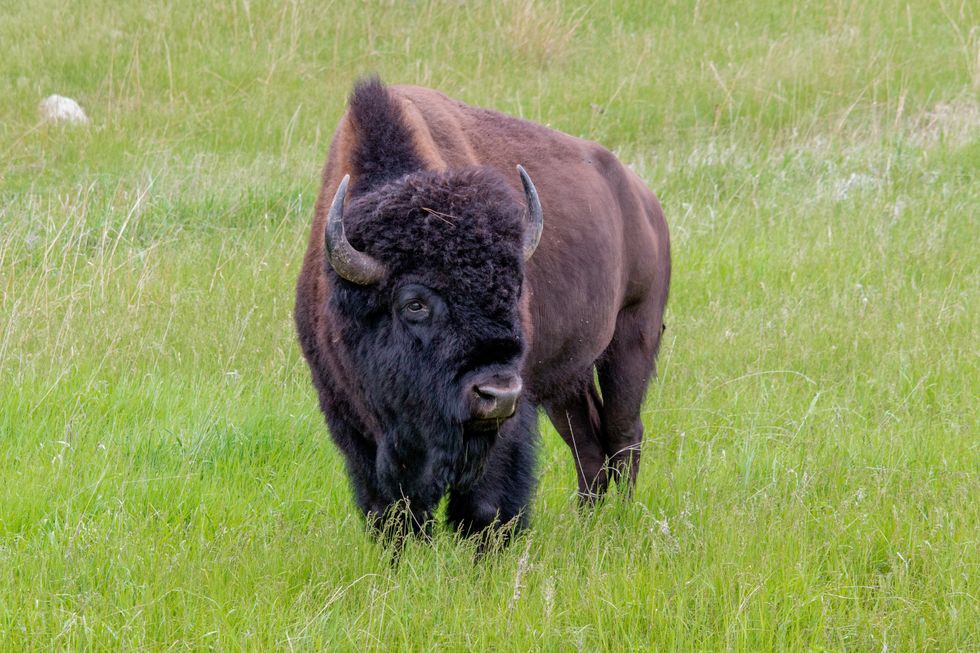When we think of a typical bison (or buffalo, as some of us may religiously refer to them as) there is probably a voguish set of images that springs to the mind's eye. We may see the sheer breadth of their shoulders; shoulders remarkably impressive for a creature that is not really known to own a gym membership. We may see the formidable-looking horns that sprout from the side of their heads like flowers from a spring field. We may even see the big chin they have, or the brutish facial expression they routinely wear, or even the clear-cut firmness of their hooves that are skilled at scuffing the plains.
But that's exactly our issue. We only picture the physical aspects of these creatures and not any of the innate characteristics they possess. Dare I say, I actually find the buffalo to be quite cute… in a weird, kind of reverent way. They certainly have an endearing stage presence on each plain they inhabit and the thought of one of them sitting on a chair and reading a newspaper fills my heart with joy and makes me laugh. Plus, the calves are some of the cutest babies that the animal kingdom has to offer us. Alas, I am quite lonely in my appreciation of the bison's appearance, but I'm sure after reading about a non-verbal philosophy these animals traffic in, our appreciation for them will be simpatico… at least on the basis of this particular philosophy.
Well, here it is:
It is a fairly unknown fact that when faced with the implementation of a great storm, unlike many of their animalistic counterparts, bison will charge straight into it. They don't hesitate. They don't contemplate. Their reaction is knee-jerk, instinctual, inspiring. The herd consensually face the juvenescence of many a storm with a resounding vivacity, an application of courage that can only be admired. This is not a form of self-harm. This is not a form of biologically imbued carelessness; an aspect of their behaviour that has yet to achieve evolutionary amelioration.
No, this is the silent philosophy of the bison that has endured for centuries.
You see, many of us will be rationally aware that storms are a fundamental part of our existence, but not in a way we feel viscerally inclined to believe such a fact. To try and live a week, a month, a year or longer without any endorsement of a storm on our path shows a flaw in our approach to life. Avoiding them is impossible. Encountering them is inevitable. We can try to assess the density of an approaching storm, but who are we trying to kid? We're not tornado experts drowning in a sea of high-tech equipment. We're human beings. We're fragile. We're vulnerable. We're sensitive to turmoil. We can never expect a tornado to hit us and predict effectively the intricacies through which it plays out. The only way we will ever come to know such information is by being inside of it.
Grief. Loneliness. Mental illness. Betrayal. Heartbreak. They're as much a chapter in our lives as the passages on love and peace and happiness and success. We cannot try to demote them to footnotes. We cannot try to demote them to mere myth. They are integral to the narrative, to the actualisation of a happy ending. They shape us. They make us learn. They make us bold and more resilient. In many ways, the hit of the odd storm allows us to strengthen our psychological immune system, as our cerebral antibodies gain more frames of reference as our encounters with storms accumulate. When grief arises again, it may hurt the same, but experience offers us a security blanket. When betrayal arises again, it may sting the same, but experience offers us a potential understanding as to why it's happened. When pain arises again, it may attack the same, but experience offers us a psychological elixir.
In essence, we should all embrace our inner bison. Running away from the storm and avoiding its mainframe is only going to exacerbate our anxieties, because we know one day we have to face it, and when it hits us and we get over it, we'll realise we spent so long in purgatory waiting for hell, when heaven was always on the wings of said hell in the first place.
I know it's scary facing the reality you might be facing right now. I know you will want to run away, procrastinate, wrap yourself in the quasi-pleasant cloak of denial. But short-term pain is better than long-term worry. Confront your boyfriend if you think he's been cheating on you. Call the doctor to see if they have your test results back. Walk into the office in which you know your boss is going to yell at you for making a grave mistake at work. Once the storm is endured, there will always come a rainbow. But how are you going to see the rainbow if you don’t allow yourself to see the rain?
And what do you think we will regret more towards the end of our lives, when we decide to look back on them? The bravery that comes with facing the storm head on, getting it over and done with, strengthening our psychological immune system? Or the lack thereof, the toleration of the abrasive anxiety that steals our futures and sustains our pasts – because we never let the storms come and clear the debris away from them?
FOLLOW ME ON TWITTER - @ryanjameskeane
FOLLOW ME ON INSTAGRAM - @ryanjameskeane.

















